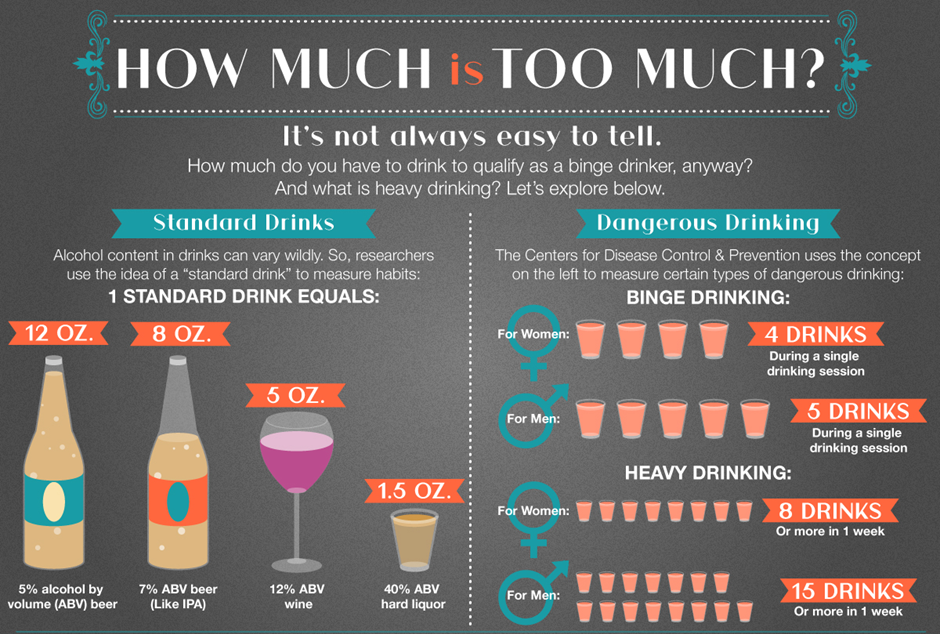Occasional alcohol drinking is a delightful gastronomical experience for some. Alcohol is also a social lubricant among some people too, allowing people to engage in conversations more comfortably. Nevertheless, anything in excess brings more harm than good—the same goes to alcohol drinking. This is when mindful drinking comes to play!

Photo by Julia Nastogadka on Unsplash
How much is too much?

Image Credits: The EDGE Treatment Centre
Binge drinking as defined by CDC:
- Men: 5 or more drinks during a drinking session (1 occasion within 2-3 hours).
- Women: 4 or more drinks during a drinking session (1 occasion within 2-3 hours).
Heavy drinking as defined by CDC:
- Men: 15 or more drink in 1 week
- Women: 8 or more drinks in 1 week
Alcohol use disorder, which in DSM-5 defined alcohol abuse and dependence as a problematic pattern of alcohol use leading to significant health damage or psychological distress.
What are the possible consequences of drinking too much alcohol? Let’s find out.
Higher risks for accidents, injuries and risky behaviors
Alcohol can produce both stimulative and sedative effects on the brain, which can lead to alteration of human behaviors. For instance, drunk driving is one of the main contributors to many traffic accidents, especially among the young people. It doesn’t just hurt the driver but also puts passengers and other road users in great danger.

Drunk driving is an offense in Malaysia. If you are caught driving under the influence of alcohol in Malaysia, you could be in serious trouble even if you are not involved in an accident. First-time offenders are liable for imprisonment for up to 2 years, fined between RM10,000 to RM30,000, and face license disqualification of at least 2 years. Repeat offenders would face fines of up to RM50,000, imprisonment up to 5 years and licence disqualification of at least 5 years. If ever you get stopped by the police and asked to take an alcohol breath test, do cooperate with them to avoid facing penalties! Those who refused to comply with police instructions could end up losing their licence, face fines up to RM30,000 and jail time up to 5 years!
Beside road accidents, excessive alcohol use can also result in violence (homicide, suicide, sexual assault etc.), risky sexual behaviors, and alcohol poisoning, which is a medical emergency due to binge drinking in a short period of time. Pregnant women who drink alcohol excessively may also experience miscarriage and stillbirth, a condition known as fetal alcohol spectrum disorders (FASDs).
Excessive alcohol drinking damage your liver
People who consume alcohol excessively for a long period of time are at risk for alcohol-related liver disease (ALD). Liver is the main organ that processes and breaks down alcohol. However, if you drink more than your liver can handle, the unprocessed alcohol can accumulate and damage the liver cells, leading to inflammation and fats build up around the liver.
At first, people who develop liver disease may not show any symptoms. Over time, however, the build-up of fats may lead to enlargement of liver and causing abdominal discomfort or pain. This stage is known as fatty liver. As the condition progresses into hepatitis, people may experience lack of appetite, fatigue, nausea and vomiting, as well as yellowing of the skin and eyes (jaundice).

Image credit: https://www.rehabspot.com/alcohol/effects-of-alcohol-abuse/alcohol-liver/
The end stage of such liver disease is called cirrhosis. There is no cure for cirrhosis, and the liver is permanently damaged. People who have cirrhosis can experience portal hypertension (increased resistance to blood flow through the liver), poor nutrition, ascites (fluid builds up in liver) and are at risk for liver cancer.
People with alcohol-related liver disease are also more likely to develop health problems such as diabetes, high blood pressure, heart attack and stroke.
Other long-term health risks
Last but not least, excessive alcohol use is found to be associated with the following problems:
- High blood pressure, heart disease, stroke, liver disease, and digestive problems
- Cancer of the breast, mouth, throat, esophagus, voice box, liver, colon, and rectum
- Weakening of the immune system, increasing the chances of getting sick
- Learning and memory problems, including dementia and poor school performance
- Mental health problems, including depression and anxiety
- Social problems, including family problems, job-related problems, and unemployment
- Alcohol use disorders or alcohol dependence
Mindful Drinking

While you don’t have to completely give up alcohol, it’s important that you make sure you have a healthy relationship with alcohol. This is when mindful drinking comes to play! It is about awareness and being present in your choices.
Stop & Reflect
It will require a period of 30 to 100 days, to cut down alcohol consumption. During this hiatus, it is a period of reflection to ask yourself about:
- The role of alcohol in your life
- The moments that make you crave for alcohol (e.g. meeting up with friends, watching a TV series after dinner etc)
- Look for other ways to fill in your cravings (e.g. soda and fresh fruit, tea, coffee)
- What you like and don’t like about drinking (e.g. the taste of alcohol, bodily sensation of a buzz etc)
Plan in Advance
Establish a plan for mindful drinking ahead of time. For example:
- Order half the amount of alcohol in your drink (for cocktail)
- Stick to the rule of no more than 3 drinks or no more than 3 nights each week
Savor your drink
Bazilian explained, “It’s about being in the moment and savoring.” You can appreciate the flavors of your drink in the fancy glassware by pausing, and enjoy the ambiance of the bar or restaurant. Quoting from the experts, you should love what you drink. If you don’t love it, don’t drink it.
If you or your loved ones think that you may have a drinking problem/alcohol use disorder, seek professional help.
A word from DOC2US
If you have any questions related to alcohol use, you can consult our professional doctors and healthcare professionals on DOC2US. DOC2US is a mobile application that allows you to talk to a doctor or any healthcare professionals via text chat at any time and from anywhere. For better communication, you can even send our online doctor images or voice messages related to your medical inquiry.
Download DOC2US app on Apple App Store, Google Play Store and Huawei App Gallery; or use our web chat at https://web.doc2us.com/
Note: DOC2US is not for medical emergencies. In the event of urgent medical conditions, please call 999.
Disclaimer: As a service to our users and general public, DOC2US provides health education contents. Please note the date of last review or update on all articles. No content on this site, regardless of date, should ever be used as a substitute for direct medical advice from your doctor or other qualified clinician.
Specific references have been linked in its relevant part of the article.
Cover image credit: Photo by Sérgio Alves Santos on Unsplash








